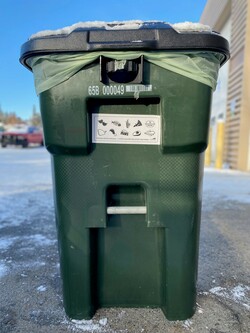Commercial Food Waste Diversion is Mandatory
Bylaw 2016-11 (Recyclables and Waste Disposal Bylaw) requires that all commercial property owners that provide space to a food service establishment must provide for collection of food waste that is separate from garbage. All businesses and organizations that generate food waste must put their food waste into food waste collection carts or bins and not in the garbage.
These food waste requirements apply to a business or organization that serves, sells, dispenses, prepares, stores, or otherwise deals with food, drinks, or meals regardless of whether there is a fee for the food (e.g. restaurants, coffee shops, healthcare facilities, childcare and senior care facilities, rental halls, cafeterias, grocery stores, food manufacturing, breweries, etc.).
Property owners can choose a private service or sign up for the Town of Canmore's Food Waste Collection Service. Sign up for the Town of Canmore's Food Waste Collection Service
More details on the program are available below.
Mandatory Food Waste Diversion Frequently Asked Questions

Town of Canmore Food Waste Collection Service
We will provide businesses with 240 L roll carts. These roll carts need to be stored indoors or in an animal-proof enclosure. If this is not possible, we have an animal-resistant cart option that can be stored outdoors.
You decide the number of carts you need and how frequently you would like them picked up. If you need an extra pick-up, you can contact us to arrange it with 24 hours' notice. Your scheduled pick-ups can be changed to account for seasonal variability.
Getting Food Waste Collection Started at your Business
-
Contact us to get started by submitting this form.
-
We will answer any questions you have and arrange a site visit to help you get set up and determine where the roll cart(s) will be collected from.
-
We will work with you to determine your initial collection schedule and the number of roll carts you require.
-
We will deliver the roll carts and collection will start on your chosen date.
Pricing
As of 2025, the collection service costs $13 per cart pick-up. The roll carts are included in the price, but you are responsible for any smaller bins you need to use.
Town of Canmore Collection Service Frequently Asked Questions
120 L cart: Depth – 53.5 cm, Width – 48.6 cm, Height – 95.5 cm.
240 L animal proof cart: Depth - 72.9 cm, Width - 71.2 cm, Height - 108.2 cm.
Food Rescue and Food Waste Reduction
There are local opportunities for food rescue and recovery that compliment the Food Waste Collection Program, potentially reducing the amount of food waste you are paying to have collected for composting.
Food Recovery Barn
Surplus food that you can’t use or sell can be brought to the Canmore Food Recovery Barn. Their mission is to recover edible food destined for the landfill from supermarkets and restaurants. They sort, display, and redistribute the recovered food, offering pickup for residents every Tuesday and Thursday from 5:30-6:15 pm at the Valley Lutheran Church in Canmore for a $5 suggested donation. If you have surplus food that could go to people instead of being composted or landfilled, get in touch through Facebook @CanmoreFoodRecoveryBarn.
Secure Used Cooking Oil in Animal-Proof Enclosures
If you operate a business that prepares cooked foods using an oil fryer, you are now required to store used cooking oil in a way will that not attract wildlife.
Bylaw 2016-11 (Recyclables and Waste Disposal Bylaw) was amended in June 2023 to regulate the safe disposal of used cooking oil. Commercial property owners who store used cooking oil must store the container inside an animal-proof enclosure or used cooking oil container enclosure.
Animal-proof containers or enclosures have to be maintained so they stay animal-proof, serviceable, and sanitary.
A permit is required to build these enclosures.

- The used cooking oil container enclosures shall be a fully enclosed structure (sides and top), constructed of wood or alternative materials as approved by the Town.
- Access to the enclosure will be a person door that can be securely latched, so that the door stays closed.
- The enclosure must have space to house the used cooking oil container and allow a person to enter and pour used cooking oil into the container.
- The structure must also allow for access from the service provider to empty the container.
- The structure must be able to contain any spillage caused by filling or emptying the used cooking oil container. The enclosure must be attached to either a concrete pad or asphalt.
- The minimum size of the enclosure is 3.4 m2 (36 ft2.)
Where Enclosures Should Located
The enclosure should be located next to an existing garbage enclosure, or near the property line so it won’t interfere with existing parking or loading areas. The enclosure should also be close to a door that has kitchen access.
Permits
A Development Permit is required to build the enclosure. Review the Cooking Oil Enclosure Checklist to learn more about what is required to submit your Development Permit Application.
Fees
The Development Permit Application fee can be found in the Master fee schedule (Non-Residential Development Permits - New Accessory Development).
Contact
If you have a question about the permit process, please submit an inquiry by clicking the following link: https://bit.ly/3iVLaYC and a member of the Planning & Development Department will get back to you within 48 hours.
If you have a question about the bylaw and what is permissible, please contact 403.678.1584.
